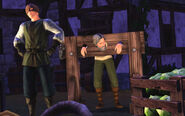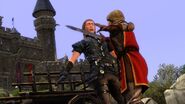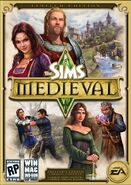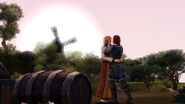
The Sims Medieval is a stand alone game in The Sims series. The Sims Medieval was officially confirmed on August 3rd, 2010 though it had been rumored before that. The game runs on The Sims 3 engine and is a spin-off similar to the way in which The Sims Stories games was a spin-off of The Sims 2. The game's first expansion pack The Sims Medieval: Pirates and Nobles was released on August 30, 2011.
Sims[]
In The Sims Medieval, the player creates and controls Hero Sims, who are crucial to completing Quests. The Hero Sims gain experience and advance in level by completing these quests.
Hero Sims[]
There are ten classes of Hero Sims:
Features[]
- Gameplay is quest-driven rather than the extreme sandbox of previous The Sims games.
- Play begins with the player choosing an Ambition (e.g. "Annex as many foreign Territories as possible.") and naming their Kingdom.
- Each Ambition grants a starting pool of Quest Points which can be spent in Kingdom Mode to choose a Quest which may also require choosing a Quest Approach as well as which Hero(es) to use. Successfully completing a quest grants Resource Points which can be spent on new buildings including those which add new Heroes to the Kingdom.
- Heroes can kill each other by agreeing to duel to the death or a monarch sentencing a subject to death.
- Religion is present and the player is its sole god. Medieval has two separate churches that believe in the same god called The Watcher (the player). The Jacoban Church is predominantly fear-based, whilst the Peteran Church preaches love. Both churches have priests, hold sermons, and perform marriages.
- The Sims Medieval allows the player to give Heroes three traits, which determine their personality and slightly alter gameplay. Two traits are positive or neutral, and each character must have one Fatal Flaw, though sims can replace it with a Legendary Trait during certain quests.
- Sims only have two needs: Energy and Hunger . A Hero's mood is measured with the focus meter, which is influenced both by happiness and by task completion.
- The player must stay in the kingdom, but the Heroes can leave. There are surrounding environments, such as the forest or other kingdoms, where sims can travel to undertake quests. As with jobs in Sims 1 & 2 the player doesn't accompany the sim -- instead Chance Cards pop up to let the player decide whether the quest is successful.
- Carrier pigeons serve as communication.
- Babies are the only sims that can age. A sim's baby will grow in to a child after a few days, but a child will only grow into an adult to replace a deceased parent. Children are non-playable and can not be killed.
- Buildings have specific functions and affect the happiness of sims. The player starts the game with the Castle and unlocks or builds others over time. Some buildings come with their own heroes, who are used to play quests with.
- Other kingdoms exist, which can be traded with, negotiated with, or even annexed.
- Create A Sim and Buy Mode (now "Furnish Mode") still exist, as does a new map feature used to place buildings in the kingdom. However, Build Mode has been removed, with some functions (e.g. wall-painting) moved to Furnish Mode.
- The Sims Medieval runs on the The Sims 3 Engine, though upgrades, such as sub-surface scattering for character models, have been added to improve texture and color.




